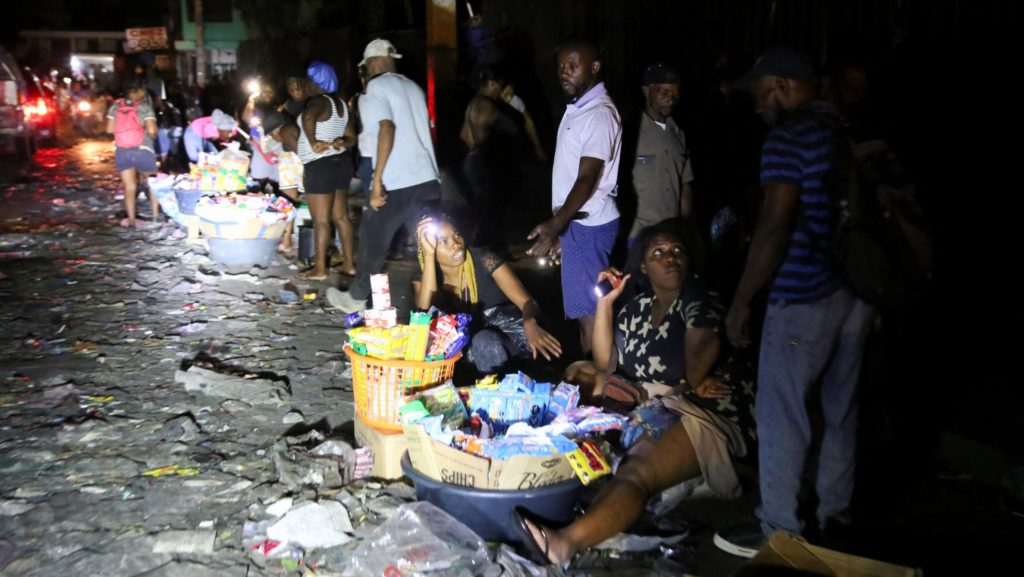Fear and sorrow have gripped a number of Haitian faithful, amid the Trump administration's ongoing aim to end humanitarian protections for those from the Caribbean nation, a Haitian Catholic chaplain told OSV News.
"Many people are afraid, and I see now that church attendance is less," said Father Eugnène Almonor, an Oblate of Mary Immaculate, who is chaplain of the Archdiocese of Philadelphia's Haitian Catholic community. "People are afraid to come to church because they don't know what could happen. They don't even go to the store."
The Department of Homeland Security announced June 27 that Temporary Protected Status -- granted to those from DHS-designated countries experiencing ongoing crises -- would be terminated for Haiti effective Sept. 2. A DHS spokesperson was quoted in the media release as saying, "The environmental situation in Haiti has improved enough that it is safe for Haitian citizens to return home."
On July 1, U.S. District Judge Brian M. Cogan of the Eastern District of New York blocked the repeal, ruling in a suit brought by nine individual TPS beneficiaries and two organizations, including the Haitian Evangelical Clergy Association.
Cogan found that DHS Secretary Kristi Noem lacked "statutory or inherent authority to partially vacate a country’s TPS designation," and ordered the program continue for Haiti until its scheduled sunset date in February 2026.
"The question here is not whether the administration has the authority to end TPS, unfortunately, but whether they can end it early," J. Kevin Appleby, senior fellow for policy and communications at the Center for Migration Studies of New York, explained to OSV News.
Appleby, who served as the U.S. Conference of Catholic Bishops' director of migration policy and public affairs from 1998-2016, said that "there is no doubt that the administration will challenge the ruling, as they have been emboldened by Supreme Court rulings that have supported their deportation policies."
But, said Appleby, "the more salient question here is whether the reason given by DHS for the decision -- that country conditions in Haiti have improved -- is accurate. Given the life-threatening conditions in Haiti, the answer to that question is no."
DHS itself said in a July 1 Federal Register notice that "it is contrary to the national interest to permit Haitian nationals … to remain temporarily in the United States," citing an influx of migration to the U.S. amid Haiti's gang violence and "weak or effectively absent central government" -- an assessment at apparent odds with DHS' June 27 claim the nation was safe for returning citizens.
"The current situation in Haiti is concerning," said DHS in the Federal Register. "However, the United States must prioritize its national interests."
Haiti has been plagued by multiple, sustained crises such as political instability, natural disasters, foreign intervention and international debt.
Some 5.4 million Haitians face "high levels of acute food insecurity" due to the armed gang violence, with 6,000 residents experiencing "catastrophic levels of hunger and a collapse of their livelihoods," according to a report released in August 2024 by the Integrated Food Security Phase Classification.
In an exclusive April 2 statement to Aid to the Church in Need, Archbishop Max Leroy Mésidor of Port-au-Prince said the nation's entrenched violence is constraining the church's ability to serve.
"Twenty-eight parishes in the Archdiocese of Port-au-Prince are closed, while around 40 are operating at minimum levels because the neighborhoods are controlled by gangs," the archbishop said. "The priests have been forced to flee, finding refuge with their families or with other clerics. They need help. The archdiocese is also in difficulty."
The archbishop also addressed the archdiocese's men and women religious in a March 30 letter, telling them, "We are going through one of the worst periods in our history as a people."
"They (DHS) will be sending back Haitians to a politically unstable and violent nation which cannot safely absorb them," said Appleby.
Haitian-born Father Almonor, who is now a U.S. citizen, said, "The situation in Haiti is not comfortable to welcome those people."
Father Almonor also pointed out that, with TPS for Haiti initiated in 2010 following a 7.0 magnitude earthquake, those being deported from the U.S. lack a homeland in which they can truly resettle.
"So after more than 10 years, 15 years, people who are here -- we now ask them to leave, to go where?" he said. "They have children, maybe have even bought a house and have (work) here."
With their fate uncertain, many in his community -- an estimated 60% of whom are under TPS protection -- are too frightened to attend an upcoming local Jubilee Year pilgrimage Father Almonor said he had organized to celebrate "our faith, our hope."
"People say to me, 'Father, I want to go there to pray, but now I don't know on the road what could happen to me. I prefer to stay here; please pray for me,'" the priest told OSV News. "We can see in their faces that it's very, very sad."

